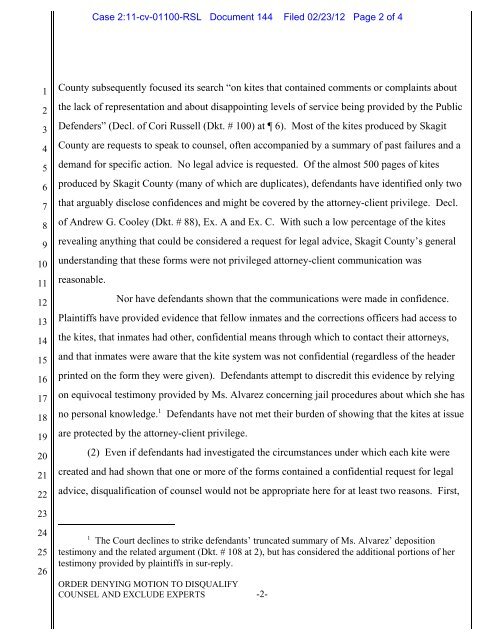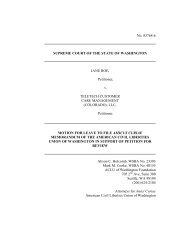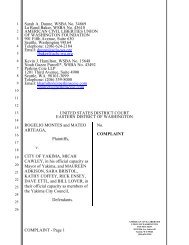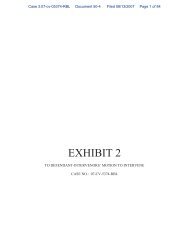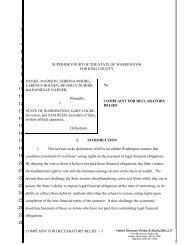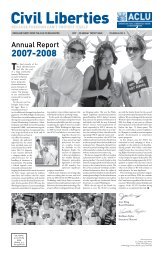order denying motion to disqualify counsel and exclude experts
order denying motion to disqualify counsel and exclude experts
order denying motion to disqualify counsel and exclude experts
You also want an ePaper? Increase the reach of your titles
YUMPU automatically turns print PDFs into web optimized ePapers that Google loves.
Case 2:11-cv-01100-RSL Document 144 Filed 02/23/12 Page 2 of 4<br />
1<br />
2<br />
3<br />
4<br />
5<br />
6<br />
7<br />
8<br />
9<br />
10<br />
11<br />
12<br />
13<br />
14<br />
15<br />
16<br />
17<br />
18<br />
19<br />
20<br />
21<br />
22<br />
County subsequently focused its search “on kites that contained comments or complaints about<br />
the lack of representation <strong>and</strong> about disappointing levels of service being provided by the Public<br />
Defenders” (Decl. of Cori Russell (Dkt. # 100) at 6). Most of the kites produced by Skagit<br />
County are requests <strong>to</strong> speak <strong>to</strong> <strong>counsel</strong>, often accompanied by a summary of past failures <strong>and</strong> a<br />
dem<strong>and</strong> for specific action. No legal advice is requested. Of the almost 500 pages of kites<br />
produced by Skagit County (many of which are duplicates), defendants have identified only two<br />
that arguably disclose confidences <strong>and</strong> might be covered by the at<strong>to</strong>rney-client privilege. Decl.<br />
of Andrew G. Cooley (Dkt. # 88), Ex. A <strong>and</strong> Ex. C. With such a low percentage of the kites<br />
revealing anything that could be considered a request for legal advice, Skagit County’s general<br />
underst<strong>and</strong>ing that these forms were not privileged at<strong>to</strong>rney-client communication was<br />
reasonable.<br />
Nor have defendants shown that the communications were made in confidence.<br />
Plaintiffs have provided evidence that fellow inmates <strong>and</strong> the corrections officers had access <strong>to</strong><br />
the kites, that inmates had other, confidential means through which <strong>to</strong> contact their at<strong>to</strong>rneys,<br />
<strong>and</strong> that inmates were aware that the kite system was not confidential (regardless of the header<br />
printed on the form they were given). Defendants attempt <strong>to</strong> discredit this evidence by relying<br />
on equivocal testimony provided by Ms. Alvarez concerning jail procedures about which she has<br />
no personal knowledge. 1 Defendants have not met their burden of showing that the kites at issue<br />
are protected by the at<strong>to</strong>rney-client privilege.<br />
(2) Even if defendants had investigated the circumstances under which each kite were<br />
created <strong>and</strong> had shown that one or more of the forms contained a confidential request for legal<br />
advice, disqualification of <strong>counsel</strong> would not be appropriate here for at least two reasons. First,<br />
23<br />
24<br />
25<br />
26<br />
1<br />
The Court declines <strong>to</strong> strike defendants’ truncated summary of Ms. Alvarez’ deposition<br />
testimony <strong>and</strong> the related argument (Dkt. # 108 at 2), but has considered the additional portions of her<br />
testimony provided by plaintiffs in sur-reply.<br />
ORDER DENYING MOTION TO DISQUALIFY<br />
COUNSEL AND EXCLUDE EXPERTS -2-


